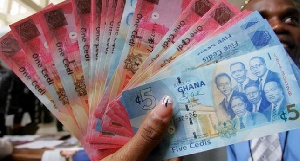The further weakening of the Ghanaian Cedi against the U.S. dollar will worsen the impact of coronavirus pandemic, the International Monetary Fund has said.
Since late February 2020, the Cedi has consistently depreciated against the dollar by -2.46 percent, year to date, and -7.34 percent year-on-year.
The IMF in its staff policy-related analysis report on the dominance of the U.S. dollar said, “For the ongoing COVID crisis, the dominance of the US dollar implies that the observed weakening of emerging and developing countries’ currencies is unlikely to provide material boost to their economies in the short term.”
“Effectively, the response of goods exports will be muted while some sectors that would normally respond more to exchange rates—like tourism—are likely to be impaired by COVID-related containment measures and consumer behavior changes,” The Fund stated.
The United Nations Conference on Trade and Development (UNCTAD) estimates that for every US$1 million lost in international tourism revenue, a country’s national income could drop by up to US$3 million, as the effects on employment could be dramatic.
Data from the Bank of Ghana suggested that the national economy entered a contraction phase right from March, the first month in which Ghana confirmed cases of coronavirus and began taking measures to curb its spread, but which inevitably also curb economic activity as well.
The central bank’s Composite Index of Economic Activity recorded its first ever year on year contraction in real terms, of 2.2 percent for March 2020. Instructively, in February, immediately prior to the arrival of COVID-19 in Ghana, the CIEA grew by 7.1 percent, year on year. The contraction in March is a reverse of the 5.6 percent growth recorded in March 2019. Indeed in 2019, the slowest growth in the CIEA was recorded in August, at 3.6 percent while the fastest growth was in December, at 14.0 percent.
The Fund also noted that the generalized strengthening of the US dollar may magnify the short-term fall in global trade and economic activity as both higher domestic prices of traded goods and services and negative balance sheet effects on importing firms contribute to lower demand for imports throughout the emerging and developing world.





